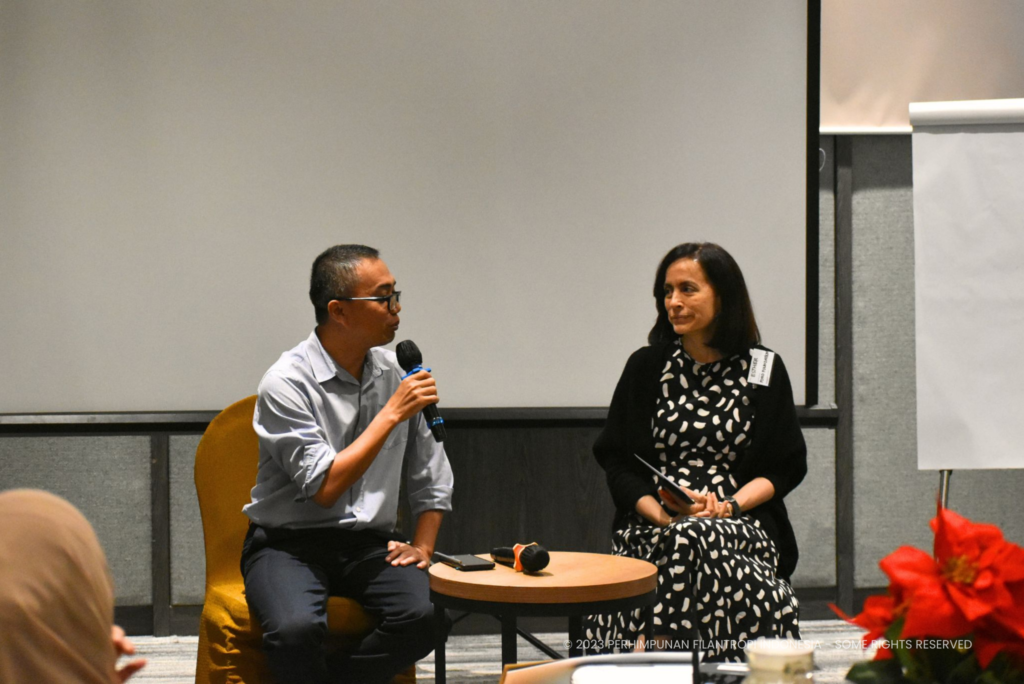Grant Management Workshop for the Philanthropy Grantmaker Institutions

In the Indonesian philanthropic landscape, the entities engaged in philanthropic activities can be classified into three categories: grantmakers, intermediaries, and implementers. As the name suggests, grantmakers are responsible for providing financial resources to community groups or smaller philanthropic institutions. Grantmakers are expected to build a robust and efficient grant management system to ensure the optimum utilization of resources.
The Indonesia Philanthropy Association (Filantropi Indonesia), in collaboration with the Tanoto Foundation and Kursor Strategic, recently organized the Philanthropy Skill Development #22 on the subject of ‘Grant Management Workshop for the Philanthropy Grantmaker Institutions’. This workshop’s primary objective was to enhance philanthropists’ capacity to manage grant funds effectively.
The event was attended by 21 participants who physically gathered in Jakarta to attend the session. In her remarks, Dinda Sonaloka, the Program and Communications Manager of the Indonesian Philanthropy Association, emphasized the need to intensify capacity building for grantmaker philanthropic institutions to foster robust and efficient grant management governance. The ultimate goal was to ensure that granted funds were utilized to align with the project’s and organization’s objectives and requirements. Effective grant management not only optimizes the utilization of philanthropic funds but also helps achieve positive impacts that align with the goals and mission of the granting organization.
Angginta Ayu, the Partnership Lead at Tanoto Foundation, expressed her gratitude towards PFI, Kursor Strategic, and the Ford Foundation for their collaboration in organizing the event. This training aims to enhance the comprehension of grantmaker philanthropic institutions concerning efficient grant management frameworks. The training also aimed to build the capacity of philanthropic institutions to develop priority agendas that align with their strategic goals and implement effective grant lifecycles.


The training commenced with a best practice sharing session with Esther Parapak, the Grant Manager at the Ford Foundation. The Ford Foundation, established in 1936, opened its office in Indonesia in 1953. The foundation fosters individual leadership, strong institutions, and innovative, often high-risk ideas. The organization supports individuals with the potential to become leaders and helps institutions to become more resilient in carrying out their activities while promoting innovative ideas. Notably, one of the grants provided by the Ford Foundation aims to strengthen the organization’s resilience through general support.
During the first day of the training session, the Director of Kursor Strategic, Rafiuddin Palinrungi, provided a comprehensive overview of grantmaking through eco-system thinking and the theory of change in the context of grantmaker organizations. He emphasized that as philanthropic grantmakers, it is essential to identify the root cause of the problem and address it holistically to ensure a permanent solution. In particular, grantmakers must identify the symptoms, initial causes, and main causes and formulate leverage points to maximize results. Additionally, the theory of change offers a framework for developing large-scale programs, which involves conducting primary or secondary research and development to identify effective, feasible, and measurable interventions.


On the second day of the training, the material shifted to the grant lifecycle, including review, selection, and grant recommendation memos. Participants were also surveyed on their organizational capacity to manage grant funding programs. It was emphasized that grant recommendation memos require effective grant strategy, organizational governance, and financial health. To this end, participants were asked to practice writing working papers with examples of existing proposals to develop good grant recommendation memos.

